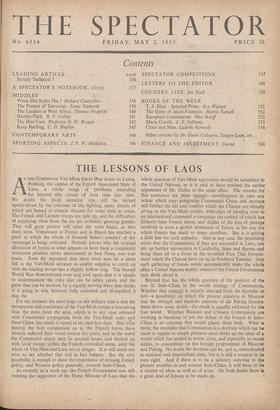THE LESSONS OF LAOS
may be. , For the moment the main hope on the military side is that the momentum and confidence of the Viet-Minh troops is less strong than the news from the area, which is in any case coloured with Communist propaganda from the Viet-Minh radio and from China, has made it sound in the past few days. But, even putting the best complexion on it, the French forces have already suffered their worst reverse for years; and at the worst the Communist attack may be pressed home, and backed up with local risings within the French-controlled areas, until the whole of Viet-Nam and Laos are in danger. It is still much too soon to say whether that will in fact happen. But the very possibility is enough to show the importance of revising French policy, and Western policy generally, towards Indo-China.
As recently as a week ago the French Government was still resisting the suggestion of the Prime Minister of Laos that the 'whole question of Viet-Minh aggression should be submitted to the United Nations, as it is said to have resisted_ the earlier arguments of Mr. Dulles to the same effect. The reasons for this resistance are plain enough—unwillingness 'to take any action which may antagonise Communist China and increase still further the aid and comfort which the Chinese are already - giving to the Viet-Minh armies; difficulties of handing over to an international command a campaign the control of which has hitherto been French alone; and dislike of the loss of prestige involved in even a partial admission of failure in the war for which France has made so many sacrifices. But it is getting a little late for such attitudes. And in any case, the possibility exists that the Communists, if they are successful in Laos, can stir up further movements. in Cambodia, Siam and Burma and bring them all to a focus in the so-called Free Thai Govern- ment which the Chinese have set up in Southern Yunnan. Any such gathering of forces would automatically make the whole affair a United Nations matter, whatever the French Government May think about it.
Beyond that lies the whole question of the position of the war in Indo-China in the world strategy of Communism. Whether that strategy is entirely directed lrom the Kremlin or not—a possibility on which the present situation in Moscow and the strength and separate interests of the Peking Govern- ment throw some doubt—the result is equally awkward for the free- world. Whether Russian and Chinese Communists are working in harmony or not the defeat of the French in Indo- China, is an outcome that would please them both. What is more, the reminder that Communism is a doctrine which can be made'to appeal to simple peasants must shake up the ideas of a world which has tended in regent years, and especially in recent weeks, 'to concentrate on the foreign programmes of Moscow and Peking. No doubt the doctrine can be, and is,,subordinated to national and imperialistic aims, but it is still a weapon in its own right. And if there is to be a salutary outcome to the present troubles in and around Indo-China, it will have to be a victory of ideas as well as of arms. On both heads there is a great deal of 'leeway to be made up. •


































 Previous page
Previous page